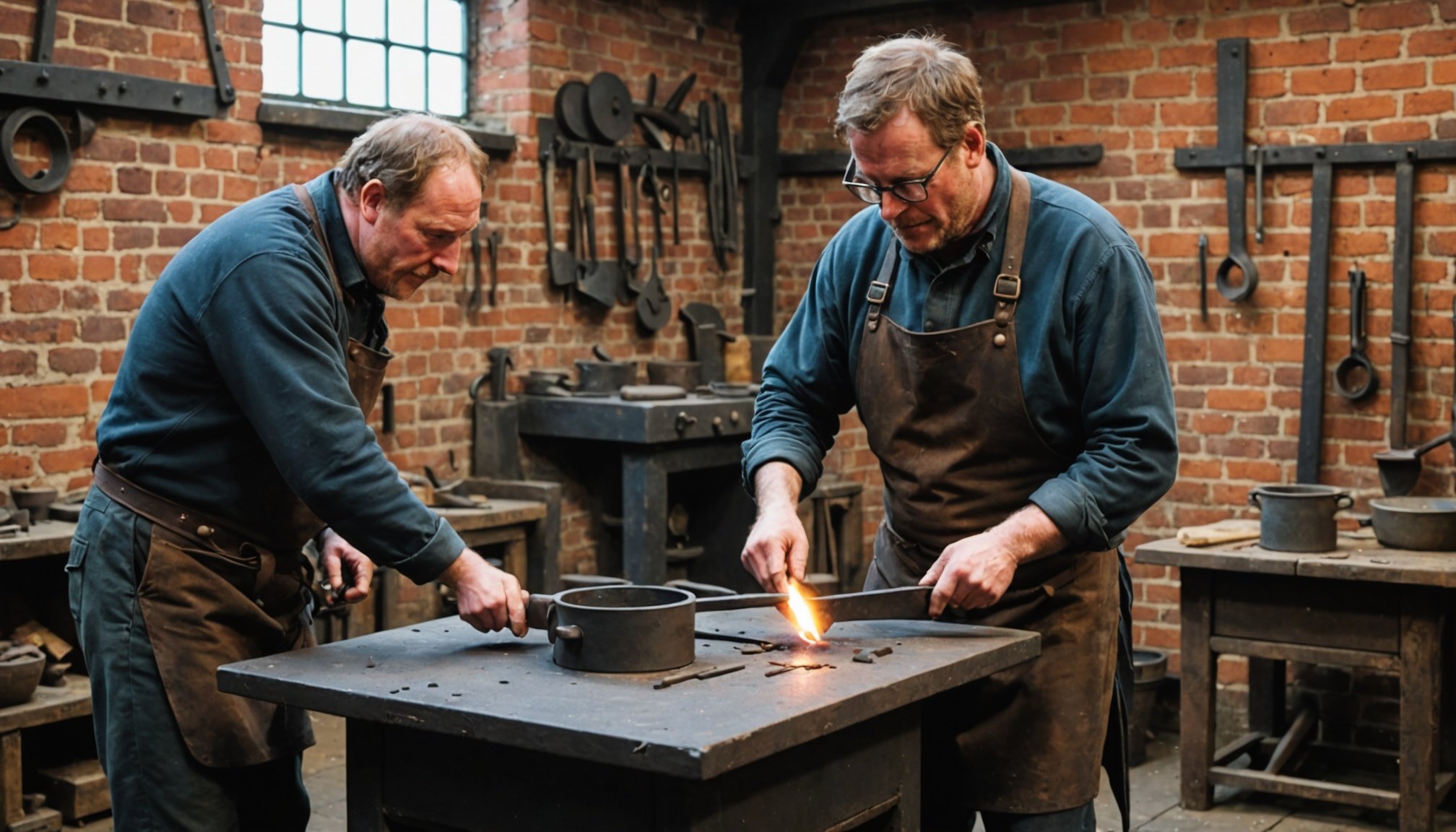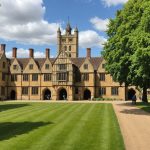Overview of British Blacksmithing Workshops
British blacksmithing has a rich and storied history, intertwined with the development of the country itself. Historically, blacksmiths played a crucial role by crafting essential tools, forming a cultural backbone in towns and villages. Over time, blacksmithing techniques have evolved, yet the core practices remain deeply authentic to their roots, offering a fascinating blend of history and artistry.
In modern times, blacksmithing workshops across Britain have become pivotal in preserving these age-old traditions. These workshops serve as guardians of craftsmanship, offering both enthusiasts and novices a window into the past while embracing contemporary methods. The determination of these workshops to maintain authentic British blacksmithing ensures that the skills and techniques passed down through generations are not lost to time.
Also to read : Discover the Best Places in the UK to Master Traditional English Hedgelaying Techniques
Participants who embark on this craft adventure can expect a hands-on experience. Workshops typically provide detailed introductions to blacksmithing techniques, allowing individuals to grasp the basic principles of metal shaping and tool creation. Through immersive sessions, attendees will learn to forge simple items, slowly building their skills in a supportive and inspiring environment. With expert guidance, participants not only witness the blacksmith’s art but also partake in a tangible connection to a craft steeped in history. This comprehensive approach ensures that everyone leaves with a newfound appreciation for the intricacies of authentic British blacksmithing.
Top Locations for Blacksmithing Workshops in the UK
Blacksmithing workshops in the UK provide unique insights into this ancient craft, offering experiences unlike any other. This section is dedicated to exploring some of the best venues that provide memorable blacksmithing experiences.
Also to see : Discover the Charm of London”s Historic East End: Join a Guided Walking Tour of Its Iconic Markets!
Location 1: The Blacksmith’s Forge
Nestled in the picturesque countryside, The Blacksmith’s Forge offers an immersive experience in traditional blacksmithing. Known for its charming rural location, the workshop combines an authentic ambiance with modern facilities to accommodate both beginners and seasoned smiths. Featuring state-of-the-art equipment, the robust setup ensures a safe and efficient experience.
Unique to this venue is the personalised learning approach. Each session is adaptable, focusing on individual skill-building, with experienced smiths guiding participants throughout the process. This hands-on interaction sets it apart from other UK workshop venues.
Booking is straightforward, with options to choose from individual sessions or group bookings. Reviews from past participants highlight the workshop’s welcoming atmosphere and the invaluable skills acquired here. Enthusiastic feedback often mentions the friendly experts and their passion for the craft.
By offering a blend of tradition and modernity, The Blacksmith’s Forge has successfully established itself as one of the best blacksmithing workshops in the country.
Skills and Techniques Learned in Workshops
Engaging in a blacksmithing workshop is a rewarding experience where participants gain essential blacksmithing skills through hands-on learning. Workshops typically start by introducing fundamental skills such as forging, shaping, and tempering metals. These foundational techniques form the crux of any blacksmith’s expertise. With a focus on traditional techniques, participants learn how to handle hammers and anvils, which are often considered the craft’s time-honoured tools.
Workshops emphasise the relevance of traditional blacksmithing methods even in today’s industrialized world. Despite the advancements in technology, these techniques retain their significance, offering a deeper understanding of metal’s properties and historical craftsmanship. Participants get an appreciation for the art of metalworking, which serves as a bridge between old-world practices and contemporary applications.
The learning process is focused on immersive and practical engagement. Hands-on activities allow participants to apply their knowledge immediately, reinforcing learning through direct application. This method fosters problem-solving and critical thinking skills, as aspiring blacksmiths encounter real-world challenges during their workshop projects. Overall, these workshops provide valuable opportunities to not just learn, but truly experience and appreciate the intricacies of blacksmithing.
Preparing for Your Blacksmithing Workshop Experience
Heading to your first blacksmithing workshop? Some thoughtful preparation can ensure a productive and enjoyable time.
Begin with attire; breathable, durable clothing is a must. Long sleeves, ideally made of natural fibers like cotton or wool, minimize the risk of burns. Steel-toed boots offer crucial protection against heavy objects while safety gear like safety goggles and gloves cannot be overlooked.
Next, consider what to bring. A notebook and pen are invaluable for jotting down learning points. A reusable water bottle is essential to stay hydrated in potentially hot conditions. Snacks or a packed lunch can keep energy levels up without needing to leave the venue.
Understanding the workshop structure can ease first-time nerves. Sessions typically start with safety briefings followed by demonstrations of techniques. Attendees can expect hands-on time at the forge, with instructors offering guidance. Working conditions are often hot and noisy, so being prepared is key to managing discomfort.
Lastly, these tips for participants underscore the importance of safety and comfort. This proactive approach ensures that the focus remains on learning and honing blacksmithing skills, creating a gratifying experience for all attendees.
Beyond Workshops: The Culture of British Blacksmithing
British blacksmithing culture extends well beyond the confines of workshops, entwining itself into community events and festivals across the country. These vibrant gatherings provide a platform to celebrate artisan craftsmanship and engage with seasoned artisans committed to perpetuating their craft. For instance, festivals often feature demonstrations, showcasing the enduring significance of blacksmithing skills in today’s world.
Community events are instrumental in keeping the blacksmithing culture alive. They offer a unique opportunity to witness the artistry and precision that define blacksmithing. Artisans play a crucial role in these settings, not only as exhibitors of their craft but also as educators who share their vast knowledge and expertise with visitors and aspiring smiths.
For individuals eager to engage with the blacksmithing community beyond workshop participation, several avenues exist. Becoming involved in community events is an excellent starting point, offering interactions with fellow enthusiasts and exposure to cutting-edge techniques. Additionally, volunteering at festivals or exhibitions can provide hands-on experience, deepening one’s understanding of this heritage craft.
Joining local or online groups dedicated to blacksmithing is another effective way to remain connected. These forums facilitate discussions on techniques, trends, and innovations, fostering a sense of camaraderie among enthusiasts. Embracing blacksmithing culture in these varied forms ensures its preservation for future generations.
Participant Reviews and Success Stories
Exploring workshop reviews provides valuable insight into the transformative journey many participants undergo. Feedback from these workshops overwhelmingly reflects positive participant experiences, with many attendees gaining a newfound appreciation for the art of blacksmithing. One participant shared how engaging in the workshops revamped their understanding of metalwork, leading them to pursue it as a hobby. Such experiences are not uncommon; many who partake in the sessions discover a thrill in crafting metal pieces, leading them to delve deeper into the craft.
Numerous success stories have emerged from these workshops, showcasing the potential for personal growth and skill development. Attendees consistently highlight the practical skills acquired and the inspiration gained, often propelling them into further explorations within blacksmithing. Indeed, the workshops serve as fertile ground for budding blacksmiths, providing the foundational knowledge required to excel.
The impact on participants’ perceptions is profound. Beyond learning techniques, individuals experience a cultural and artistic awakening. These workshops bridge the gap between curiosity and expertise, offering an accessible platform for anyone intrigued by blacksmithing. The collective experiences reflect a deepened respect for this ancient craft and often reignite a passion for learning and creating in the forge.











